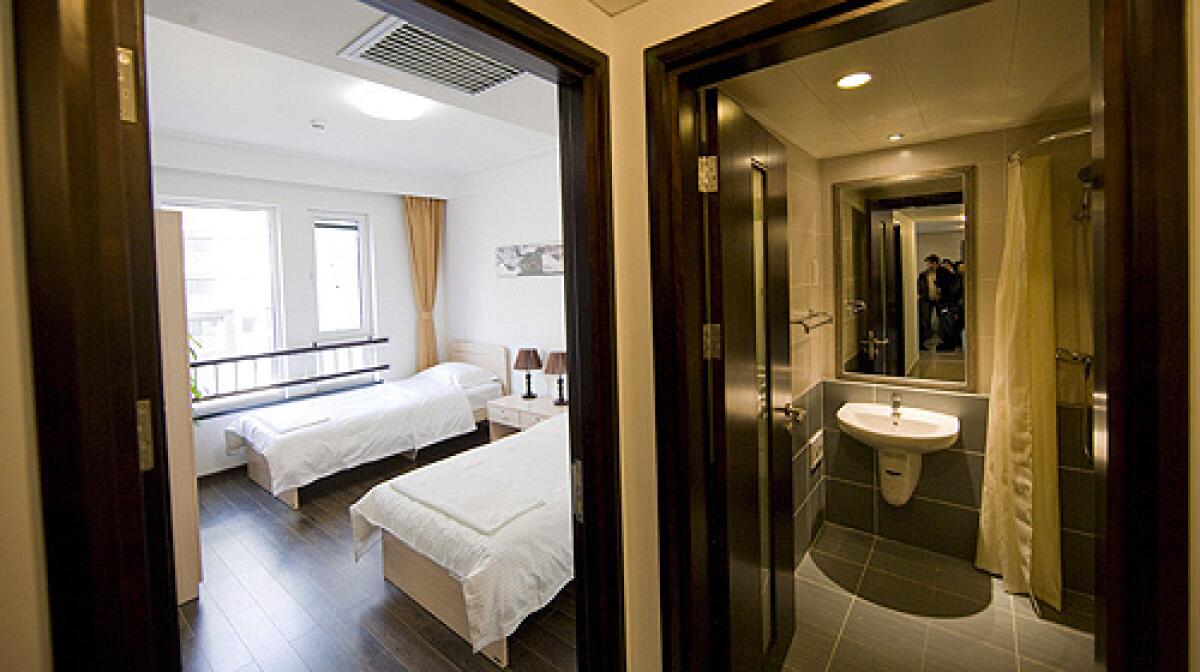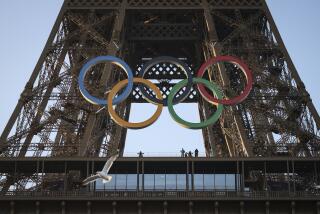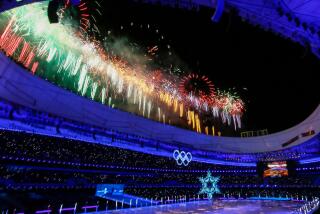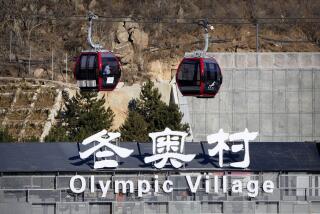In Beijing, ultramodern living for Olympians

- Share via
BEIJING — Athletes coming to this summer’s Olympics will feast in a cafeteria big enough to seat 5,000 and enjoy hot showers warmed by an ultramodern solar power system and, in this officially atheist nation, can worship in a new prayer center designed to accommodate the world’s most popular religions.
Those are some of the marquee features of the Beijing Olympic village, prospective home to the 16,000 athletes and officials from around the world who will attend the Olympic Games here in the Chinese capital.
During a preview Wednesday of the nearly completed village, organizers allowed hundreds of reporters to peek inside only two minimally furnished but stylish apartments to show how six to eight athletes will share the three- or four-bedroom suites.
The business-savvy Chinese developer who built the eco-friendly facilities plans to transform the simple six- and nine-story sports dormitories into luxury condos when the games are over.
Even though they won’t be available until at least the end of 2009, all the units are sold out, said Yu Debin, deputy director of the village.
“If you want to buy one today, you won’t be able to,” Yu said. “They are very popular with people looking for good location, good environment and proximity to the Olympic landmarks.”
Built about a block from the futuristic competition venues and abutting a sprawling park billed as the largest urban ecological garden in Asia, the Olympic village embodies the spirit of the red-hot Chinese economy, organizers said.
This ancient capital is being remade into a modern metropolis in warp speed.
The Olympic village broke ground in the summer of 2005. Along with the other Olympics-related mega-projects, such as the new airport terminal and subway lines, the village has helped change the landscape of rural suburbs.
“A few years ago, this area was mostly farmland,” said Yang Qiangguo, 53, a Beijing resident and police officer assigned to protect the apartments.
“The people who lived here have all been relocated and given new apartments.”
The stadiums that rose from the earth look otherworldly. The National Stadium is designed to look like a bird’s nest made from braids of twisting steel. It seats 91,000 spectators and will be the showpiece venue for the opening and closing ceremonies. The National Aquatics Center, nicknamed the “water cube” and which will host the swimming and diving events, looks like a giant blue box with plastic molecules bubbling on the surface.
Beijing city officials say the total price tag for the competition venues is about $1.8 billion, with funding coming from a combination of government money, private investors and donations.
One 20,000-seat indoor stadium for gymnastics was paid for by an anonymous Chinese donor who wrote a check for $65 million, said Jeffrey Ruffolo, senior advisor to the Beijing Olympics Committee and the only American in that capacity.
“Nothing in this country is too unbelievable,” Ruffolo said, adding that about 6,300 residents had to be relocated to make way for the sporting venues.
“The ability to get things done here is really staggering. In Los Angeles it would take endless discussions to build any structure. Here they decided to do it, and kaboom! It happens.”
The Chinese have mostly rallied behind this once-in-a-lifetime sporting event to showcase the new China and the progress the country has made since emerging from centuries of isolation and decades of communist extremism.
With that, however, also comes closer scrutiny of the communist government and its record on human rights.
Along with reports about potential health hazards from air pollution in Beijing, China has been stung by criticism of its support for the Sudanese government and its role in the violence in Darfur.
The recent slew of scandals over tainted Chinese-made products, including toothpaste and dumplings, also has caused problems.
The U.S. Olympic team has said it would break with tradition by flying in its own food and let its delegation eat meals in a separate facility.
Yu said that was unfortunate because the concerns over the quality of food produced in China were exaggerated. The safety of the food is guaranteed, he said.
More to Read
Sign up for Essential California
The most important California stories and recommendations in your inbox every morning.
You may occasionally receive promotional content from the Los Angeles Times.













